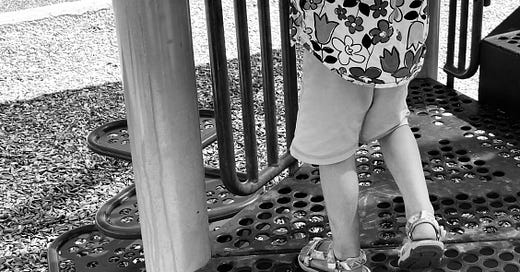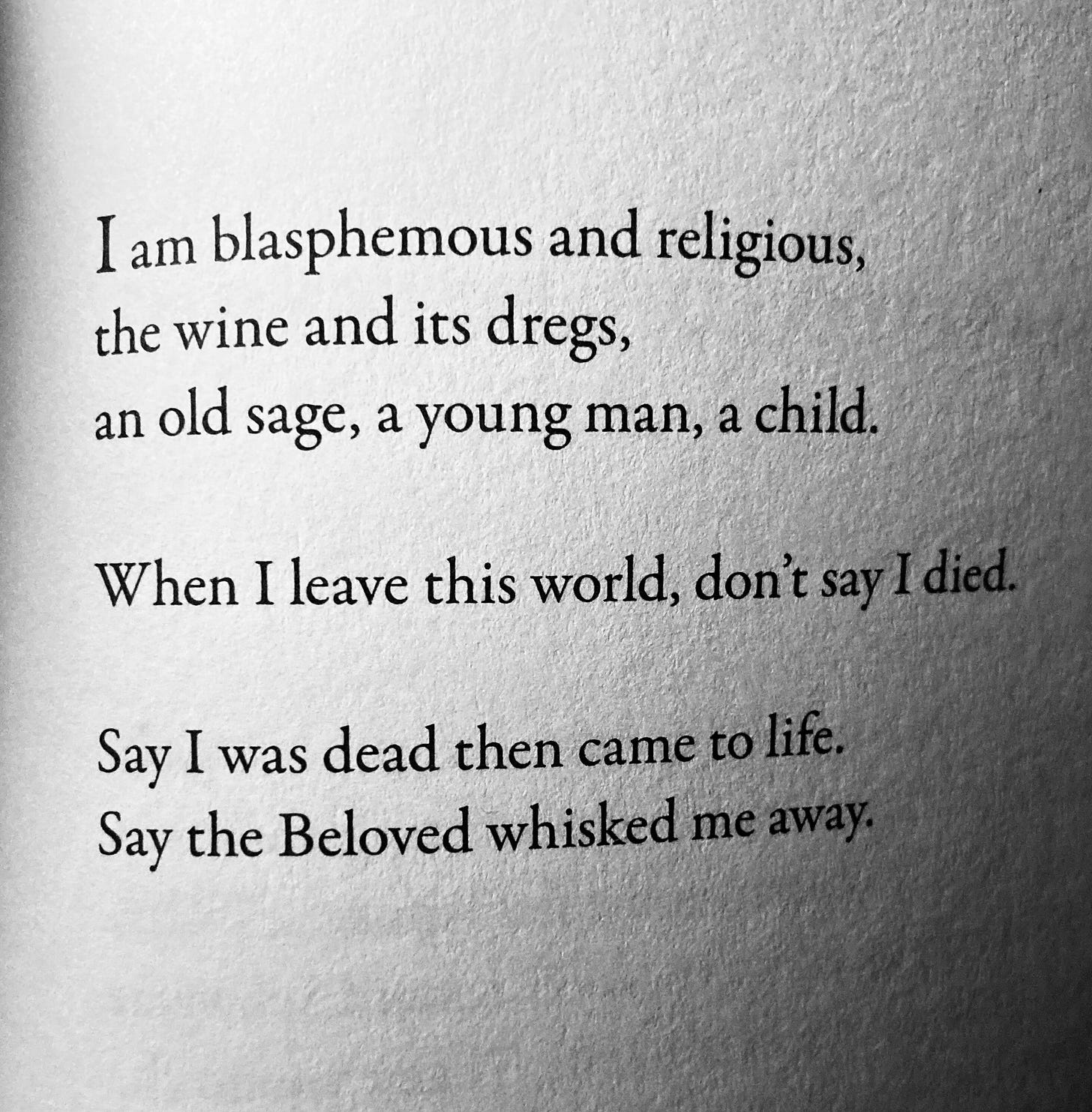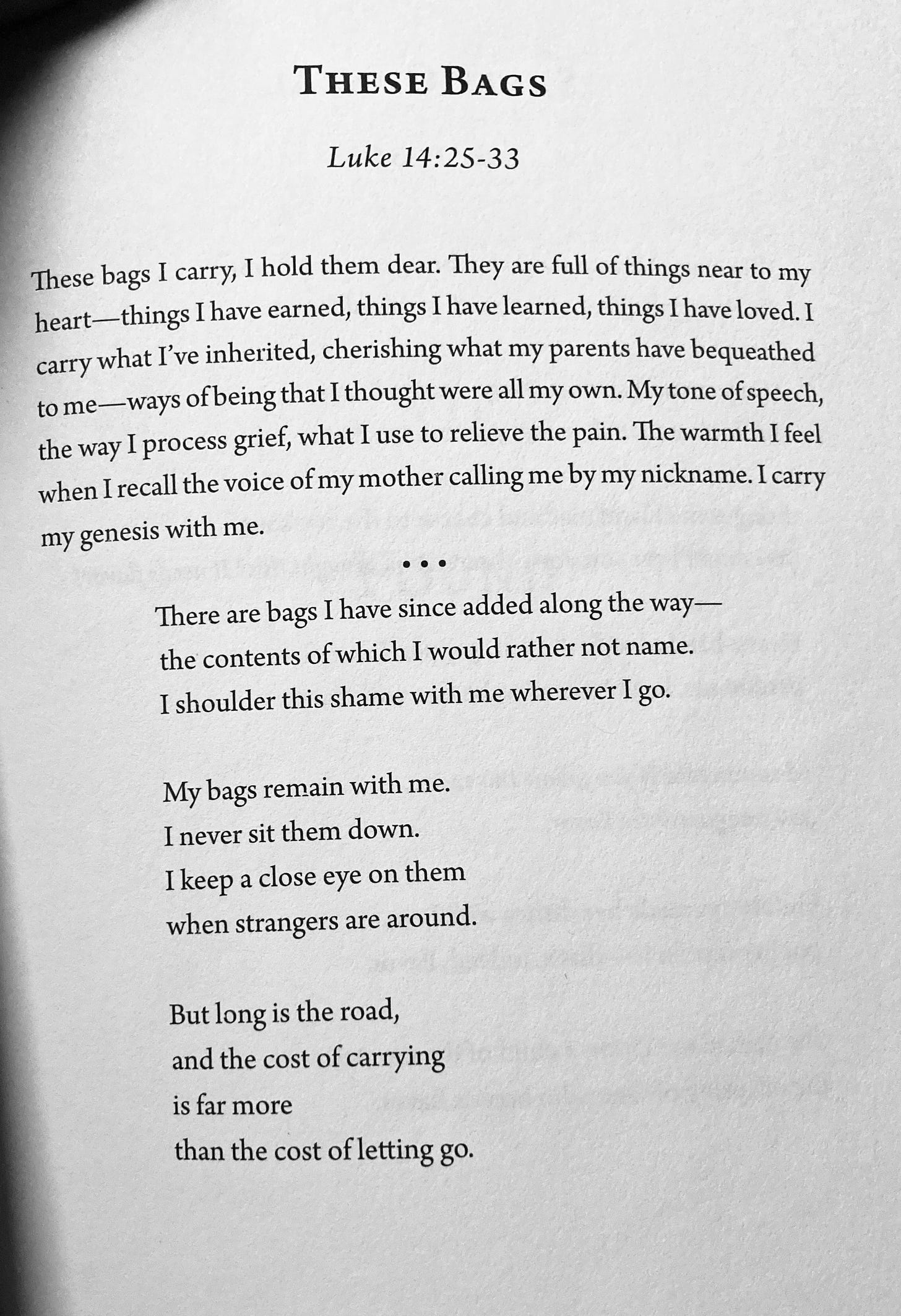I am convinced that memory has a gravitational force…It is constantly attracting us. Those who have a memory are able to live in the fragile present moment. Those who have none don’t live anywhere.”
- Gaspar Galaz
The present moment passes over the sprigs of memory. That line flashes before me and I am well pleased. I walk into the bathroom and sit.1 The warmth of the toilet seat testifies to a recent memory of fleshy cheeks pressing down while cold porcelain holds them up. A tacit reminder of our shared creatureliness. One of those unstated vulnerabilities that permeates all human activities. And if you ask me, I believe our level of awareness to this bares the caliber of our presence. Vulnerability of presence moves at the speed of awareness. More tortoise than hare, a pace that suits my pursuits. It is a stroll “ away from our egos with our hands stuck in our pockets and a whistle on our lips.”2 But I have been spending too much time on the saddle these past few months, trotting at a right clip in any direction that will receive me. This resting squat has got me mulling things over. Speed blurs landmarks in this scenic life. Travel companions get left behind. A paradox of sorts, rushing hits pause and friendships unwittingly wither away. Stories lope out of sight in divergent directions. Losing friends this way stings. Is it due to my inattention to the vulnerability of our shared creatureliness? That is the story I am telling myself. Others tell me, “that is life” or “you have kids”3. All true, but not all tensions are resolved, nor do good reasons absolve resulting absences. The line arcs across my mind again, “the present moment passes over the sprigs of memory.” It is typical, really, for me to learn of my decorative current state in moments of pause in the echo chambers of tiles and mirrors.
Spying a bath toy at my feet, I bring my head towards the tiled floor for closer inspection. I see it more clearly. A pirate cat, eye patch and all. My face is so close to the buccaneer it is as if I am bowing before him in greeting. I chuckle. Shiver me whiskers. Staying with my forehead pointed down towards the feline bath toy a realization dawns on me. I don't want to get back up from this bow. A bow is a bending of the heart to the earth in humility and reverence. The return to full posture brings one back to a place of inherent dignity and equality. There are times when I want to bend low like this and remain. It is a way to existentially hide. Tucked under the eyes of judges. Glares and leers can go unnoticed. But then again, so would smiles, invitations, and the cheeky expressions of pirate cats. Conversely, it is equally true that I do not want to bow. I want to hold the gaze of projected strength. Shoulders back, chest puffed, standing tall, and empty eyes begging to be seen. What a fickle creature I am when emotions wrestle me for the wheel and steer me towards chaos and concern. These tactics of control and recklessness hide in plain sight.
Control wipes me out and does me in. That might be a good epitaph for my tombstone. Or perhaps, seduced by Mystery. The decorative states of busyness and the self-conscious bowing are all eventually seduced by Mystery. Two sides of the same meditation cushion. That is where it all collides for my ensouled jangling bones.
Fr. Shigeto Vincent Oshida, a Dominican priest, is whistling at me from beyond the veil. He described himself as a Zen Buddhist who encountered Christ. I am touched by this. Fr. Oshida lived his vocation to build community with the poor while playfully splashing about in the hidden streams with both Jesus and the Buddha. One particular lesson allured me most. Fr. Oshida speaks of being drawn to Jesus of Nazareth because he was seduced by the suffering of others. The Nazarene could not help himself. He would see the suffering and be seduced to attend to the hurting person or the dire situation. Even when touched in a crowd, he would know that suffering was seducing him. Fr. Oshida picked up the whistling way of being from Jesus and acted upon it. His particular seduction was to offer relief for those who were suffering on the margins by building contemplative community at the Takamori Hermitage in the Japanese Alps.
I am seduced by stillness. Each morning I step outside and see the Sandia Mountains sitting firmly, beckoning me to join. Reverently from afar or intimately up close, the Sandias don’t care. They know their seduction turns my knees to prickly pear jelly. On the other end of the spectrum I am drawn to those who are frenzied and frazzled, those who need stillness in their lives. I am also seduced by loneliness. When I talk with those who feel alone, unloved, or that they don’t belong, my heart cracks wide. A presence larger than myself seeks to embrace them. One of my bedtime mantras with my kids is, “I am so glad you are here, I love you so much.” Nothing fancy, but I want them to know they belong and they are loved. Always. And when I feel the pangs of loneliness between my armpits, I seek to hear it as a cry of prayer, to trust a deeper invitation that is silently, and achingly, breaking interiorly to a Mystery calling me home.4
Seduction is always risky, regardless of the trusted parties involved. For me, dangerous words are necessary to communicate the unsafe conditions of the spiritual path. Jesus was seduced by the suffering of others, look where that got him. The seduction of stillness and loneliness are not always pure for me. There is power in each that can bowl me over if I try to control it or if it gets out of hand. Seduction is a blade that needs sharpening and practice, loosened for service while having a firm grip. One slip can wound. And therein lies the vocational call to attend to the edge with great care. Fr. Oshida said that one’s vocation is to simply respond to Jesus’s invitation to “Come and See.”5
“Jesus responds to the need, to what he sees. He is a man made to be seduced by the suffering of others.”6 The question has been building, perhaps even breathing and burning within you, what do you go gaga over? What seduces you? It might just be your vocational call to discover.
April NonRequired Reading List
The Healing Path: A Memoir and an Invitation by James Finley (Get it at the Public Library or Bookshop)
I was overly giddy, strangely nervous, but above all grateful to be in conversation with Jim about his breathtaking new book, The Healing Path: A Memoir and an Invitation. Each page is a thousand pages deep, that is how Jim walks about the world, drawing from the depths and teaching with winsome grace, poetics, and of course, wisdom.
I have read The Healing Path twice now and I don’t see an end to rereading it. The memoir charts the unfolding of Jim’s life; terrorizing trauma and abuse he endured as a child and at the monastery, graced invitations of transformative amidst the anguish, spiritual guidance from Thomas Merton, the richness of marriage to his beloved late wife, Maureen, and so much more. Published by the fine folks at Orbis Books who are bringing us some of the best contemplative writing this side of the century.
It is a rare and delicate thing to say about a book, dear reader, but The Healing Path could change your life.
Gold by Rumi, translated and edited by Haleh Liza Gafori (Get it at the Public Library or Bookshop)
April is national poetry month. But come on, highlighting poetry for merely one month is a sin against the muse. A few weeks back, I was sitting around a Sunday morning campfire in the Arizona desert when a friend ran to get his copy of Gold because he could not wait to introduce me to Haleh Liza Gafori’s translation of Rumi. He read a poem to the group. We received it in audible smiles and joyful silences. I got a copy the next day.
Gold should be the next translation of Rumi you buy7, spill wine on, fold the pages of, write "that's it!", and copy from onto slick postcards for friends far away from home. Haleh Liza Gafori’s translations sing with the vibrancy and rhythm of Rumi (Gafori is a vocalist too). Gafori’s expert eye of translation comes from a lifetime of chewing and embodying the poetry of Rumi.
Gold should be a part of every mystical poetry lover’s library. There is nothing else to say about it.
Touch the Earth: Poems on the Way by Drew Jackson (Get it at the Public Library or Bookshop)
Rumi was a preacher before he was a poet. While reading Gold I was wishing that was a more popular trend. Then I remembered that Drew Jackson is a pastor and a poet. Those who dare take on these two roles are worth paying attention to. In Touch the Earth, Jackson takes on a project that demands the third-eyed sight of taking pastoral gifts and study into the post of the poet.
In Touch the Earth, Jackson moves through the Gospel of Luke starting with chapter nine until the end, crafting poems in conversation with the gospel text. It is an exercise of grounded love. Jackson draws from a wide array of inputs and influences; Jay-Z, his daughters, Thomas Merton, trauma and healing, fatherly wisdom, state-sanctioned violence, Rosa Parks, and much more. It is poetry that makes you pause, pull out the gospel text, and pause again.
Touch the Earth is poetry that dances with the Gospel of Luke, arranging it in a new conversation, and uplifting an unblinking bodied experience of reality.
Jesus in the Hands of Buddha: The Life and Legacy of Shigeto Vincent Oshida, OP by Lucien Miller (Get it at the Public Library or Bookshop)
Fr. Oshida was a Zen master and Dominican priest. He called himself a Zen Buddhist who encountered Christ. The path that was his to walk is laden with suffering, allurement, and calling. The biographical portion of Jesus in the Hands of Buddha serves up a concise offering of Fr. Oshida’s ambling journey. Nearly each page covers a near death experience or a winking at being tricked by God.
Luicen Miller is at his best when he is describing his experience at Fr. Oshida’s Takamori Hemitage in the Japanse Alps or relaying his teachings during a retreat. The description of the Fire-Mass at Takamori Hermitage is reason enough for a reader to consider becoming Catholic, while the teachings and practice of Fr. Oshida will tilt you towards Zen. Miller captures Oshida’s nuanced spirit. Clearly, Lucien Miller is a relentless seeker who never writes himself hubristically, but shares his interactions and understanding from Fr. Oshida with great care.
The bulk of Jesus in the Hands of Buddha recreates a contemplative retreat that Fr. Oshida led in the United States. Miller carefully reimagines the experience from memories, notes, texts, and conversations from those who were also present. Fr. Oshida’s core teachings during the retreat are a contemplative excavation of the Gospel of John. Like the Fire-Mass, Fr. Oshida does not waste energy on the externalities, but ignites a fire in the hearts of his students to discipline their practice with a wink while serving the suffering of the world.
Jesus in the Hands of Buddha is for any reader whose contemplative heart races in the mystical mundanity of simplicity and service.
Contemplify Update
Season Three is complete. A bonus episode with James Finley, a contemplative master of our times, is available. I can’t recommend that conversation enough. You can find the complete list of Contemplify episodes here and below are the three most recent episodes. Season Four is growing tall and long, getting corn fed and sunned.
James Finley on The Healing Path (Bonus Episode / Season 3, Ep 13)
It’s Not About the Beer, It’s About the Beer (Bonus Musing / Season 3, Ep 12)
Prairie Eye & Woods Eye (Bonus Musing / Season 3, Ep 11)
All episodes are available from Contemplify through these fine outlets: Apple Podcasts, Spotify, Stitcher, Podbean, or Overcast
Arts & Articles
THE FOREST BEYOND by Jeremy Seifert & Fred Bahnson (Emergence): The work of Seifert and Bahnson have been staples in this section of Contemplify. Their stories root along the banks of community memory, washing the wounds of loss as an act of hope. This short film focuses on “Senen Kaisi, a young Shipibo woman from Santa Isabel de Bahuanisho, makes her first journey to the retreating edge of this ancestral forest, which once stretched all the way to her village.” Watch the film here.
THE HUMBLE CHRISTIAN MYSTIC YOU SHOULD REALLY KNOW ABOUT by Betsy Shirley (Sojourners): Brother Lawrence got me started on a dedicated contemplative path. I love Carmen Acevedo Butcher’s translation of The Practice of the Presence. The spirit of Br. Lawrence is ready for a whole new generation of readers. You can read a delightful interview with Carmen here. (h/t to Poff)
YOUR EMAIL DOES NOT CONSTITUTE MY EMERGENCY by Adam Grant (NYT): The urgency around digital communication is bullshit. Email is a burden, blessing, and leaky boat. I try to practice slow email. That often tips into email overload and I don’t respond to emails for months or I lose them in the pile. A pleasant read that reminds me I am not alone in email abundance that leads to anxiety. Read the article here. (h/t to Lee)
I REALLY DIDN’T WANT TO GO by Lauren Oyler (Harper’s): This piece made me laugh out loud. The celebrity wellness cruise is the funhouse mirror of popular culture’s obsessions.
A suit of armor
made of silk
is too tight
to breathe right.
Walking naked
is too showy
So I’ll skinny dip
under the moonlight.
Seduced by the still moon,
Paul
The bathroom has become a sanctuary of awe. Praise be the body for processing nutrients and waste, the hidden functionality of our bodies. Bathroom prayers of gratitude have become my norm this spring.
Page, 45. Miller, Lucien. Jesus in the Hands of Buddha: The Life and Legacy of Shigeto Vincent Oshida, OP. Liturgical Press, 2022.
No friendships have suffered more for me than those friends without kids
Doesn’t always work out this way by the by.
Page 127. Miller, Lucien. Jesus in the Hands of Buddha: The Life and Legacy of Shigeto Vincent Oshida, OP. Liturgical Press, 2022.
Ibid., 115.
You might even give away other translations (or faux translations).







I’d guess this is the first contemplative phenomenology of the #2 ever written. And in the spirit of reciprocity, I’ll confess to have started reading it while similarly enthroned 😉
So much goodness in this months nonrequired reading list, Paul. Tipping a glass of Western Australia’s finest West Coast IPA your way for all your work.